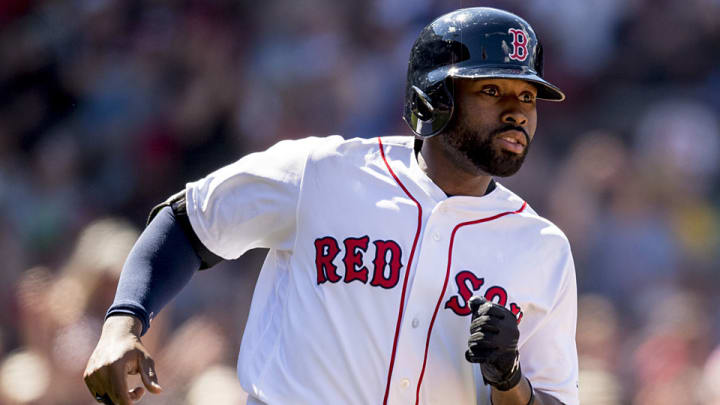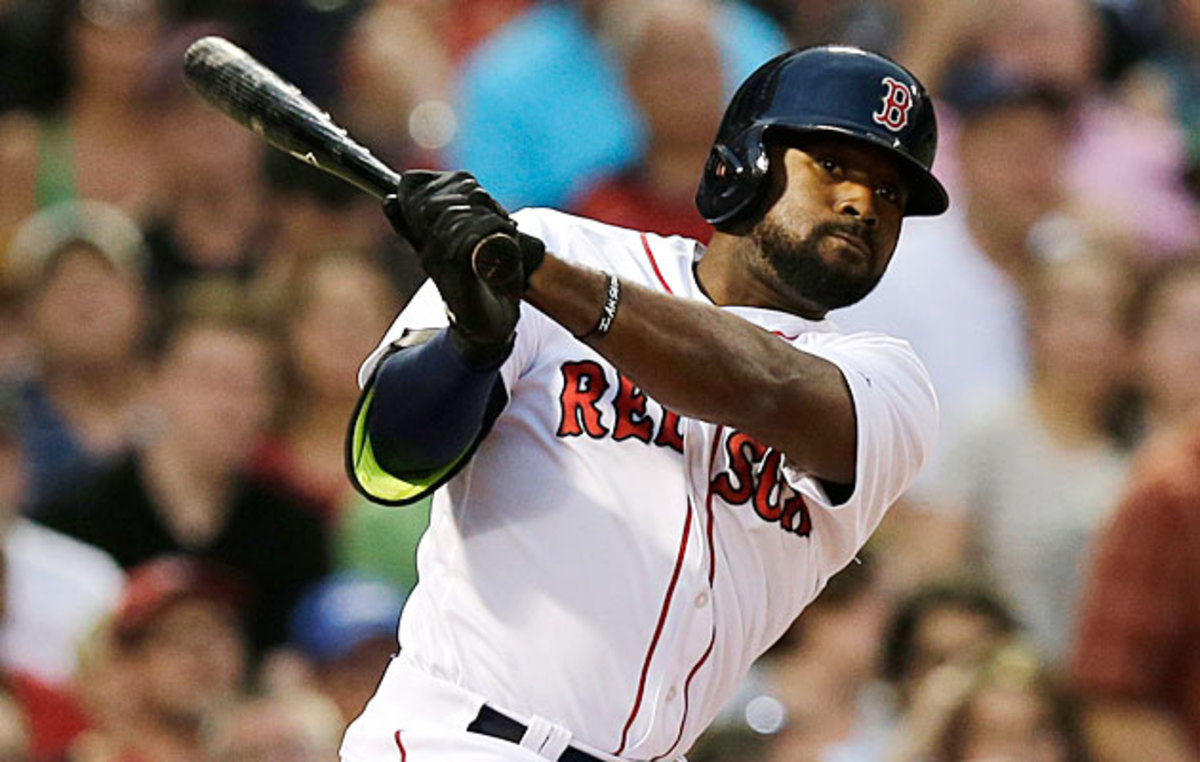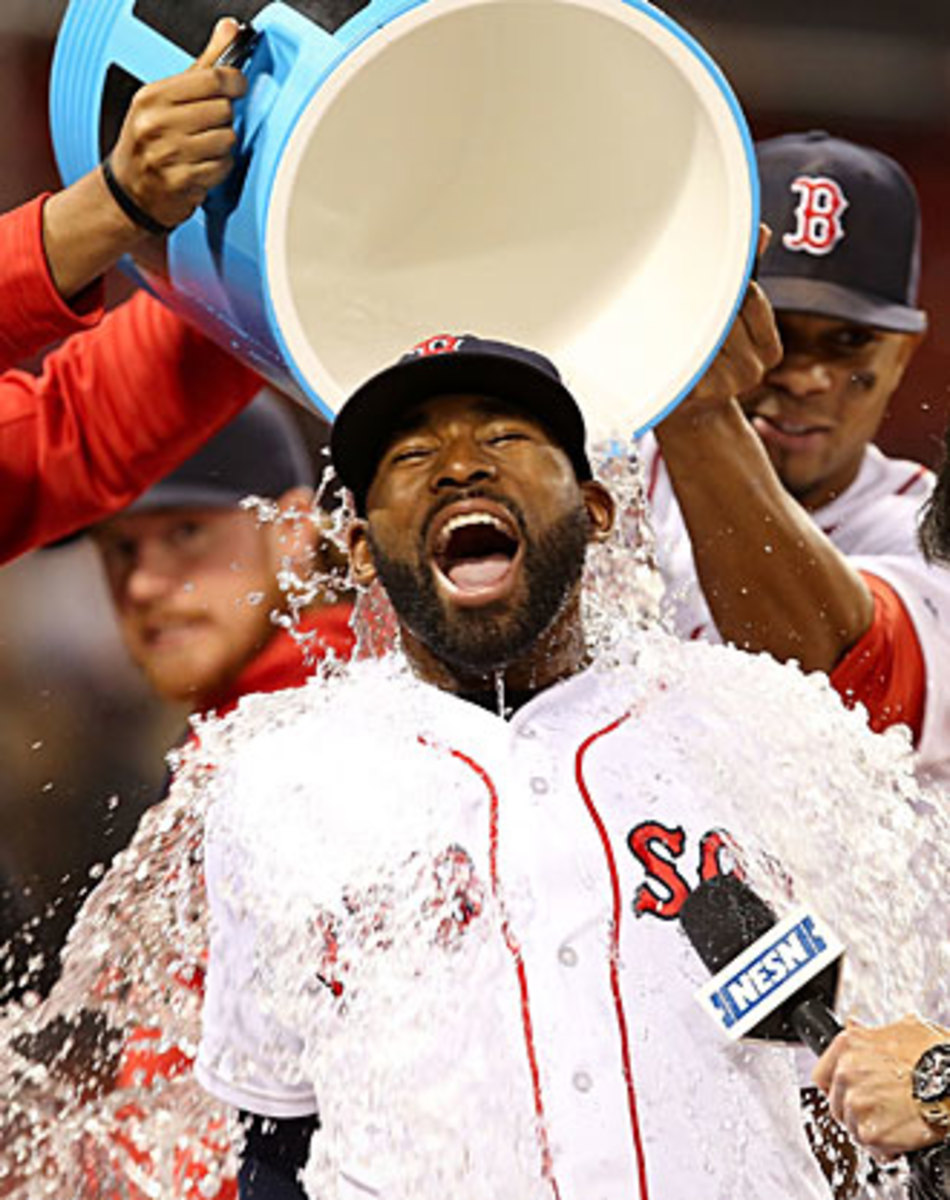Just. Keep. Playing.: The long-awaited breakout of Jackie Bradley Jr.

This story appeared in the June 27, 2016 issue of SPORTS ILLUSTRATED. To subscribe to the magazine, click here.
The Boston media legion massed near the locker of the hottest hitter on the Red Sox, and when he arrived, it tactically encircled him, so that from the back of the scrum you could make out only the top of his head through the cameras and recorders. The questions fired at him were largely meta in nature: How was he handling the attention that his out-of-nowhere onslaught had brought him? Jackie Bradley Jr., the kid with the crooner’s name and easy poise, played it cool. “You can’t really let it affect you,” he said. “It’s just something I’ve always been able to do—tune it out, and keep playing.”
This was back in 2013, in the Red Sox’ spring training clubhouse in Fort Myers, Fla.
Bradley was 22, less than two years removed from leading South Carolina to back-to-back College World Series titles, when he hit .419 that spring and forced himself into Boston’s Opening Day lineup in leftfield. He had yet to play a game above Double A and thought that he might never establish residency in Pawtucket, the Rhode Island city that has been home to the Red Sox’ Triple A affiliate since 1973. But Bradley would join the PawSox on April 20, demoted after a 3-for-31 big league start. Over the next three years he’d have plenty of opportunities to frequent the Dave and Buster’s in neighboring Providence.
He spent much of 2014 with the big club, but by the end of the summer he was serving largely as a pinch runner and defensive replacement, a role so tenuous that he lived in Pawtucket the whole season. He became intimately familiar with the drive to Boston. “An hour and change to Fenway,” he says. “An hour and change back.” At the plate, though, as he candidly admitted, he was lost. He finished the season batting .198. In two seasons he had gone from spring wunderkind to aging, tailspinning prospect. Such players almost always wind up in a place worse than Pawtucket.
• WATCH: Picking top 10 moments from season's first half
This season the Boston media is again loitering by the now 26-year-old Bradley’s locker—this time, in Fenway Park. Over his first 79 games he has become an unlikely centerpiece of the game’s top-scoring- offense. He enters play on Wednesday batting .293 with 14 homers, 54 RBIs and baseball’s sixth-best OPS, .929. In late May he finished off a 29-game hitting streak, five away from Dom DiMaggio’s 67-year-old club record.
Bradley’s delayed renaissance can be viewed as a lesson for clubs not to prematurely give up on a prospect. To Chili Davis, the Red Sox’ second-year hitting coach, it’s something else: “The lesson really is for guys not to give up on themselves,” he says. “It would have been easy for Jackie to go to Triple A and say, ‘Man, I want out. It’s not gonna work here for me. Blah, blah, blah.’ He didn’t.” For Davis, Bradley’s breakout is a result of the very thing he promised Boston he would always do, three long years ago in Fort Myers: “He just kept playing.”
*****
Bradley’s aren’t the only fortunes to have been reversed in Boston this season. The Red Sox, who followed their 2013 title with consecutive last-place finishes, are back near the top of the American League East, and their Green Monster–dinging offense has led the way. While Boston pitchers have so far yielded 412 runs, the 13th most in the majors, Sox hitters have scored 465, for a per-game average of 5.6, which would represent the league’s highest in this decade. That combination has translated to a record of 45-38, third best in the AL East and good for the league's second wild-card spot. Several hours before a recent game, Dave Dombrowski, who arrived in Boston as president of baseball operations last August after 14 seasons as the Tigers’ GM, sat in the third row behind home plate in a ballpark that was still new to him. Though it was the first hot day at Fenway this season, and he was wearing a dark suit, no beads of sweat escaped his immaculately combed silver hair. He was asked if—in an age in which championships are won by teams like the Royals and the Giants that are focused on preventing runs—the new market inefficiency might come from scoring a hell of a lot of them.
• VERDUCCI: Pitching struggles could doom Boston's playoff hopes
“I think people would say, ‘Oh, yeah, I’d love to do that,’ but the reality is that it’s very hard to do,” Dombrowski said. Boston’s last-place finish last year meant that the team could give Bradley everyday playing time down the stretch, so the club could see what they had in him once and for all. But that four of the AL’s top 21 OPS leaders are currently Red Soxwas really the result of a perfect storm that could not be forecast. In addition to Bradley’s breakout, his even younger and more athletic teammates, outfielder Mookie Betts and shortstop Xander Bogaerts—both 23—have excelled too; Betts is second in the AL in runs scored, with 71, and Bogaerts is third in batting, at .332. Travis Shaw, a once lightly regarded prospect, has not only seized an unexpected opportunity at third base but has also provided solid offense. Second baseman Dustin Pedroia has finally returned to health.
On top of all that, David Ortiz, at the age of 40, is in the process of making his final season his best one yet. Through Tuesday he was hitting a career-high .337 with 19 homers and led baseball in doubles (34), slugging (.670), OPS (1.100) and total bases (193). “It’s very perfect, you know?” Ortiz says, of his club’s offense. “I don’t have to burn all the cells that I got left. I’m, like, extremely relaxed now, which is good for hitting. People are always expecting me to be the guy to come through, get that good hit. But now that everyone, pretty much, can do that? It makes it easier for me.”
Big Papi’s impending retirement has created a certain urgency, as the Red Sox’ hit show might run for only one season, at least at its current Nielsen-busting ratings. Dombrowski insists that he has yet to broach the subject of an extension with his slugger. “He’s been very adamant that he made the decision to retire,” he says. “In my situation you respect his word.” Still, the GM won’t rule out the possibility of eventually trying to lure Ortiz back, with Bradley Jr. and friends as bait. Says Dombrowski, “We’ve got a long time until the end of the season.”
As has always been the case for their now-entrenched centerfielder, the only thing for the Red Sox to do is to just keep playing.
*****

Jackie Bradley Jr.'s surge has prompted the return of another question that first became popular four springs ago: Who is Jackie Bradley Sr.? The answer sat a few dozen rows behind home plate before the game that would prove the final one in his son’s hitting streak, on May 25.
He has driven a bus for the Greater Richmond Transit Company, in Virginia, for 25 years. He had used his vacation from Route 37, a 68-minute loop that runs north and back from the city’s downtown, to travel to Boston with his sister Beulah. When he was on his route, he’d follow his son’s streak through regular texts from his sister—“Inning by inning, pitch by pitch,” Beulah says—and now they were there to watch it in person. Several people at Fenway, including Ortiz, said that Bradley Sr. looks young enough to be his son’s brother. “It might be because we don’t drink or smoke,” the father says. Beulah says that they might be mistaken for one another, if not for Bradley Sr.’s gold tooth.
• Subscribe to get the best of Sports Illustrated delivered right to your inbox
Bradley Sr. was christened in honor of singer Jackie Wilson, of the silky “Lonely Teardrops” and “(Your Love Keeps Lifting Me) Higher and Higher,” and he passed the name down. He and Jackie Jr.’s mother, a former Virginia state trooper named Alfreda Hagans, divorced when Junior was three, and amicable custody transfers would often happen on his bus. “On the weekend, when it was time for me to get him, she’d bring him and put him on the bus with me till I got off,” Bradley Sr. says. Of course, from the time he was small, Bradley Jr. only wanted to do one thing.
Bradley Jr. has always been a brilliant and tenacious outfielder. Bradley Sr., who never remarried, fully realized how defensively gifted his son was when the boy was 16 and Senior overheard a mother at a youth tournament in Jupiter, Fla., warning her own son’s team, “I don’t know who this guy is in centerfield, but you better not hit it out there.” Junior has also always been a cagey, if unprolific, base stealer. In the majors he has run 21 times and been caught just once, leading some to suggest he should try more often. “I like to pick certain opportunities where I know it’s gonna be helpful for a team,” he says. “I don’t want to run just to run.”
He had also always hit, until he didn’t. “I had never seen Jackie do that bad,” says his father of Junior’s 2014 struggles. “I’m thinking it’s a mental thing. He said that he just had to make an adjustment.”

In fact, Bradley had become virtually unrecognizable in the batter’s box. As he’d tinkered with his swing, his formerly closed stance opened, and at the urging of coaches his high leg kick disappeared. He could no longer hit balls to all fields, rolling over outside breaking stuff instead of driving it the other way. By last summer, with his big league future slipping away, he decided the only thing to do was to be true to himself. That meant kicking his leg. “I’m gonna go back to something I feel very comfortable with, and I’m gonna stick with it,” he says of his resolution. “And I’m gonna get better.”
He did—he hit .354 last August after another promotion from Pawtucket, which at the time represented his best big league month by 76 points—in part because he paired his old style with a new approach. Bradley had long believed that being a good hitter meant working deep into counts. As a teenager he sometimes let a pair of meaty pitches pass by him so he could work on his two-strike technique. But by last summer he’d decided that if he got a hittable pitch, no matter when it arrived, he was going to swing at it. “I don’t think it’s hard to change once you see that it needs to be changed,” he says. “You try to work counts up here, and you’re letting balls right down the middle go by, you might not get that pitch again. I go in with the mind-set of, I’m not giving away pitches. I’m gonna go after it.”
Last season Bradley saw 4.2 pitches per plate appearance. This season he is seeing 3.7. His aggressiveness makes him part of a vanguard of once stubbornly patient hitters across the league—including the Nationals' Daniel Murphy and the Giants' Buster Posey—who have realized that running up a starter’s pitch count only means, among other things, that they’ll sooner face a reliever who in the modern era is often throwing fresh gas. “A handful of years ago it started to be that the guy they brought in for the sixth was throwing 95,” says Dombrowski.
Like all long hitting streaks, Bradley’s was equal parts fluke and skill. In his case it was confirmation that he had finally discovered a hitting alchemy that worked. “You should learn from this,” Davis told him, just before it ended. “What am I thinking? What am I trying to do? Where’s my focus right now?”
Bradley Sr. knows that if his son has anything, it’s focus. “That’s Jackie,” he says. “He’s never been upset about anything. He knew he could do it. He just knew he could pull through the struggle he had.”
*****
As Bradley’s hitting streak got serious, he was presented with an admittedly far-fetched hypothetical. His wife, Erin, was due to give birth to the couple’s first child in mid-June, by which time he might have been approaching Joe DiMaggio’s record of 56 games. What if he’d begun a game by going, say, 0 for 1, and the dugout phone rang?
“Bye,” he said. “I’m gone. Nothing can stop me from seeing my firstborn. I’m leaving this field in a heartbeat.”
As it turned out, he went on paternity leave on May 31, five days after his streak had ended. His daughter, Emerson, was born on June 2. Boston’s offense did fine in his absence: It scored 22 runs in three games without him. It was only more evidence that this year’s Red Sox lineup is the closest thing in baseball to unstoppable.
